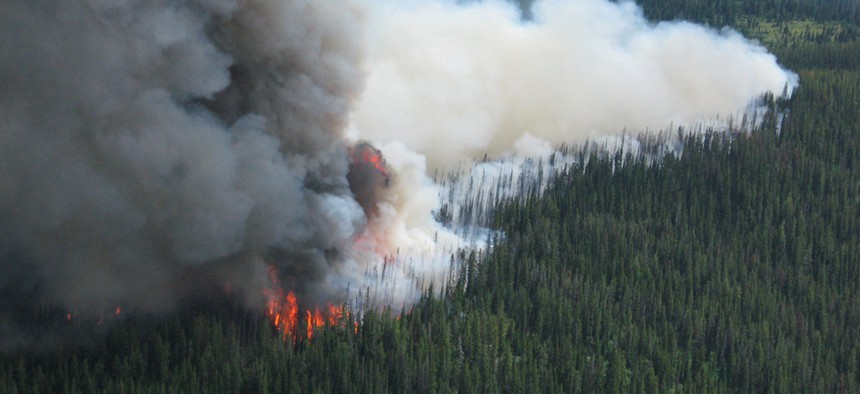
The Packer Meadows Fire on the Lolo National Forest in 201. United States Forest Service file photo
Can Drones Solve America’s Wildfire Crisis?
The Congress gets creative in a quest to fight fire.
As a dangerous wildfire season gets underway across America, Congress is frantically searching for ways to stamp out the flames.
House Republicans have crafted legislation set to see a vote Thursday that they say will fix budget shortfalls plaguing the U.S. Forest Service and ensure that America's forests are properly managed to stave off the worst wildfires.
But that's not the only option on the table. A coalition of House Democrats and Republicans are pushing legislation that could make it easier for federal, state, and local agencies to use drones to combat out-of-control wildfires.
America's wildfires have grown in size and intensity in recent years—a problem made worse by global warming, years-long drought, property development on the outskirts of cities and suburbs next to parks and forests, and a build up of easy-to-ignite forest debris.
The cost of fighting fires has also risen dramatically. The Forest Service predicts that it could spend up to $1.6 billion to put out the flames this year. As the service doles out that money, dollars are likely to drain away from other key activities such as forest management and efforts to maintain roads and trails.
All that has dialed up pressure on Capitol Hill to solve the problem—and lawmakers have so far shown a willingness to get creative.
House Republicans say that legislation expected to see a vote this week simply makes sense. It would combat cost overruns by allowing the Federal Emergency Management Agency to dole out funds when the Forest Service exhausts its fire budget. The legislation would also speed up efforts to pare back forest growth and clear out debris—provisions that defenders say are crucial to stave off the worst wildfires.
"We're using sound science to manage the forests," Arkansas GOP Rep. Bruce Westerman, the sponsor of the bill, said in an interview Tuesday. "I see a lot of wins. This would be good for forest health, it will make our forests more resilient and it will get them to where they can withstand wildfires and not have catastrophic events."
Solving America's wildfire crisis won't be easy. A slate of conservation groups have signed on to support the fire funding and forest management legislation. But far from winning widespread praise from across the aisle, the bill has attracted scant Democratic support so far. Arizona congresswoman Ann Kirkpatrick is the lone Democrat to sign on as a cosponsor.
And environmental groups warn that the legislation would do more harm than good.
"The ironically named 'Resilient Federal Forests Act' is nothing more than a goody bag for the timber industry, putting its profits ahead of our national forests, communities, drinking water, and wildlife habitat," said Marni Salmon, Sierra Club's associate Washington representative.
More than 30 environmental organizations, including the Sierra Club, the Wilderness Society, Defenders of Wildlife, and Earthjustice have signed a letter opposing the bill.
The Senate has been working to fix the wildfire problem for several years. Legislation sponsored by Democrat Ron Wyden of Oregon and Republican Mike Crapo of Idaho aims to to end the cycle of cost overruns that require the Forest Service to take money away from other projects. That bill would pay for the worst and most costly wildfires out of a separate disaster funding account, but does not seek to address forest management.
While Congress works to find a solution to the Forest Service funding shortfalls, a handful of lawmakers are hoping that drones may be able to help.
Democratic Rep. Kyrsten Sinema of Arizona and a slate of Republican lawmakers including Duncan Hunter, Paul Gosar, and Martha McSally introduced legislation last month that would set up a federal task force to weigh the benefits and risks of using drones to fight wildfires.
Public agencies and organizations can already apply for permission from the Federal Aviation Administration to use drones. But backers of that legislation say that regulatory delays can hold up the approval process and slow down firefighters as they work to access unmanned aircraft.
"This innovative solution not only has bipartisan support, but also taps into the limitless capabilities UAS [unmanned aircraft systems] technology can play in protecting homeowners, farms, and above all else, American lives," Gosar said.
Still, drones won't be a silver bullet. Lawmakers backing the effort to set up a task force are quick to caution that drones complement—rather than replace—traditional firefighting efforts.
Private sector use of drones can even get in the way. The National Interagency Fire Center recently put out a public service announcement warning the public not to fly drones near the scene of a fire. "Drones and wildfires don't mix, a narrator's voice intones during the commercial. "Be smart, be safe, stay away."







